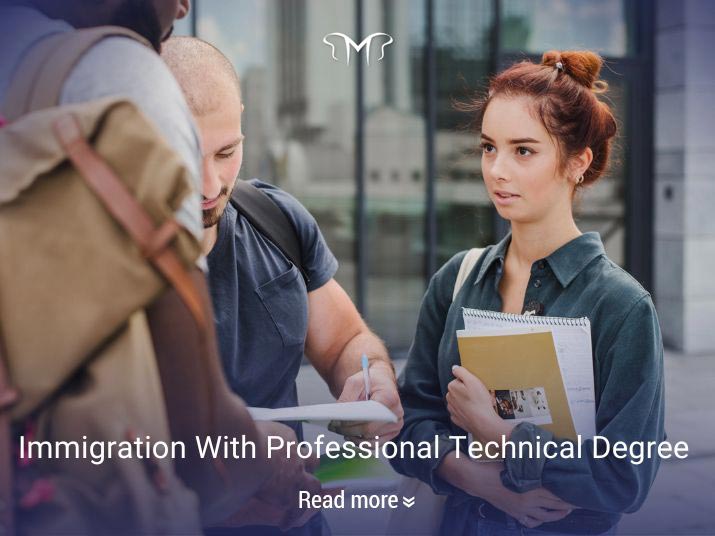
Work Migration to Germany with a Vocational Qualification in 2024
Germany, due to its extensive need for skilled labor, has consistently sought to facilitate immigration pathways. This has attracted a significant number of individuals in recent years. Migrating for work with a vocational qualification in Germany offers an excellent opportunity for those who do not hold advanced degrees, as Germany does not require a university diploma for this process.The country has implemented regulations that allow professionals and skilled workers to migrate and work, even with only a high school diploma or vocational qualification. This approach is particularly beneficial given Germany's urgent demand for labor in various sectors.
In this article, we at Monarch Immigration Agency will explore key topics related to migrating for work with a vocational qualification in Germany. We will discuss the conditions required for this migration, the steps involved in validating vocational qualifications obtained in your home country, the necessary documents for immigration, and more.If you are interested in this topic or are considering work migration to Germany with a vocational qualification, stay with us until the end of this article.
Conditions for Work Migration to Germany with a Vocational Qualification
Migrating for work to Germany with a vocational qualification is equivalent to working in the country with a high school diploma or even without any formal education. In simpler terms, if you have completed your education up to the high school level or higher and possess a vocational qualification in specific fields, you can migrate to Germany. To obtain a specialized visa for Germany with your vocational qualification, you must meet certain conditions, which are outlined below. The requirements for obtaining a work residence permit in Germany with a vocational qualification include:
- Obtaining one of Germany's work visas, such as the Job Seeker Visa or a Job Offer Visa.
- Financial stability: You must demonstrate that you have sufficient financial resources to cover your living expenses in Germany.
- Recognition of your vocational qualification: Your vocational certificate must be validated and recognized by German authorities.
- Age limit: You should be no older than 40 or 45 years.
An important point to consider is that depending on the job you are pursuing in Germany, you will need to demonstrate proficiency in the German language at various levels. Therefore, fluency in German is another condition for finding work in Germany with a vocational qualification. Additionally, your resume should clearly indicate that no local worker in Germany can fill the position you are applying for.
Interestingly, sometimes your vocational qualification can be converted into work experience in Germany. For instance, if you have completed an internship during your vocational training, that period can be counted as relevant work experience. Finally, keep in mind that while providing work experience is essential for some employers, for others, it may simply enhance your resume and provide you with a competitive edge.

Key Sectors with High Demand
- Skilled Trades: There is a strong need for skilled tradespeople, including electricians, plumbers, carpenters, and welders. These professions are essential for the construction and manufacturing industries, which are vital to Germany’s economy.
- Healthcare: The healthcare sector is another area experiencing a substantial shortage of qualified professionals. There is a growing demand for nurses, caregivers, and medical technicians. Vocational qualifications in healthcare can open doors to numerous job opportunities in hospitals, clinics, and elderly care facilities.
- Information Technology: The tech industry is booming, with many companies seeking IT specialists. Vocational qualifications in areas such as programming, network administration, and cybersecurity can provide a pathway to various roles in this rapidly evolving field.
- Engineering: Germany is known for its engineering prowess, particularly in automotive, mechanical, and electrical engineering. Vocational training in engineering-related fields can lead to positions in design, manufacturing, and maintenance.
- Hospitality and Tourism: With a thriving tourism industry, there is a demand for skilled workers in hospitality roles, including chefs, hotel managers, and service staff. Vocational qualifications in culinary arts or hospitality management can enhance your chances of finding employment in this sector.
- Logistics and Transportation: Germany’s position as a central hub for trade in Europe has led to a growing need for logistics and transportation professionals. Roles such as warehouse managers, logistics coordinators, and truck drivers are in high demand.
Advantages of Working Immigration to Germany with a Vocational Qualification
Immigrating for work with a vocational qualification to Germany can offer several benefits, such as:
- Wide Range of Job Opportunities in Related Fields Since: Germany is considered one of the most industrialized countries in the world, many job opportunities available there are related to vocational and technical fields. The wide variety of jobs can positively influence the motivation of individuals to migrate for work with a vocational qualification to Germany.
- Competitive Salary: Another important factor influencing the decision to migrate for work with a vocational qualification to Germany is the competitive salary and high quality of life for individuals working in these fields. Generally, salaries for jobs related to vocational education in Germany range from 30,000 to 50,000 euros annually, which significantly impacts lifestyle and quality of life.
Read more: The highest-earning fields of vocational training in Germany - Availability of Jobs for Vocational Qualifications: Many vocational fields in Germany do not require university degrees, which makes these jobs accessible to a larger number of people. Anyone with the necessary qualifications and vocational certification can find work in Germany.
- Career Advancement Opportunities: Who wouldn’t want career advancement? Since Germany has one of the most dynamic job markets in the world, not only does migrating for work with a vocational qualification offer career growth opportunities, but individuals in all job positions in the country can also rely on opportunities for promotion and professional development.

Disadvantages of Working Immigration to Germany with a Vocational Qualification
Although obtaining a work visa for Germany with a vocational qualification offers numerous benefits, it is important to note that there are also drawbacks to the process. Some of the disadvantages of immigrating to Germany with vocational qualifications, which may discourage individuals from pursuing a vocational certification for migration, include:
- Complex Visa and Immigration Process
- Increased Demand and High Competition for Jobs: The high competition among the workforce for immigration to Germany can make the process more challenging.
- Heavy Taxes in Germany: Germany has a high tax burden, which may impact individuals' disposable income.
- Difficult Process of Obtaining, Recognizing, and Equating the original Vocational Qualifications in Germany: The process of having vocational qualifications from your home country recognized and equivalent to German standards can be complicated.
- Difficulty Learning the German Language for Immigration: The language barrier can be a significant challenge for immigrants planning to work in Germany.
Required Documents for Working Immigration to Germany with a Vocational Qualification
To immigrate to Germany for work with a vocational qualification, you must first visit the German embassy in your country of residence, submit your documents, and schedule an interview. The question that arises is: What documents are required for obtaining a work visa to Germany for individuals with a vocational qualification? The required documents for job seeking in Germany with a vocational qualification are as follows:
- Identification Documents and a Valid Passport
- Educational Qualifications Certified by the German Embassy
- Language Proficiency Documents (German or English)
- Proof of Financial Means
- Health Certificate and Insurance
- Receipt of Payment for Relevant Fees
- Certificate of No Criminal Record

Role of Vocational Qualification Immigration in Germany's Ausbildung Program 2024
It is interesting to know that by participating in Germany's "Ausbildung" programs—an educational system that combines theoretical and practical training—you can obtain a vocational qualification in any field you are interested in. Individuals who wish to migrate and join the Ausbildung programs in Germany, if they hold a vocational qualification from their home country, along with work experience and a strong resume, have a high chance of being accepted into these programs. These 3-year programs are one of the pathways for skilled professionals to immigrate to Germany, and upon completion, you will receive one of the most recognized vocational qualifications in the world from this country. For example, Ausbildung programs have provided an excellent opportunity for nurses to migrate to Germany, with numerous applicants.
In summary, participating in the Ausbildung program with your vocational qualification will be an opportunity for you, and having a vocational qualification from your home country can even increase your chances of being accepted into these programs.
Additional Training Programs and Working Immigration with a Vocational Qualification to Germany
Germany's vocational training programs are one of the ways for skilled professionals to migrate to Germany. These programs are designed for job seekers who wish to acquire practical skills for entering the German job market. The further training programs, known as Weitbildung, are a professional development path toward the job market. These programs, similar to Ausbildung, focus on acquiring the necessary skills for various professions and industries. They provide the expertise needed to work in a specific area of the market or industry. Many of these programs are related to similar vocational programs in our country. Those who wish to immigrate to Germany with a vocational qualification can use these further training opportunities upon arrival to enhance their skills and knowledge in their desired field. Employment opportunities for skilled professionals in Germany are greater for individuals who have completed these programs, and by participating in them, you can improve your position and add more value for your employer.
Final Thoughts
Germany’s simplified immigration policies have made it even more popular among individuals looking to migrate to this country. Since changes in immigration laws were made, working immigration with a vocational qualification has become increasingly common. If you are someone with a vocational qualification, you can turn your dream of migrating to this European country into reality by having your qualification recognized and fulfilling the other conditions mentioned in this article. Monarch Migration Holding is the most specialized institution for helping nurses, healthcare staff, and other medical professionals migrate to Germany. For more information and free consultation in this area, you can contact us through the numbers listed on our website.
Frequently asked questions
Is it possible to work in Germany with a professional technical degree?
Yes; Work migration is possible with a professional technical degree. You just need to meet the conditions mentioned in this article.
What documents are needed to immigrate to Germany with a professional technical degree?
Valid identification documents and passports, educational documents approved by the German Embassy, language documents (German or English), proof of financial ability, proof of physical and mental health and insurance, receipts for payment of relevant expenses, proof of no bad background, including the necessary documents for immigration They are professionals with a technical degree.
What are the advantages of immigrating to Germany with a professional technical degree?
The high variety of jobs in this field, career advancement, decent income and the availability of jobs related to this field are among these advantages.


